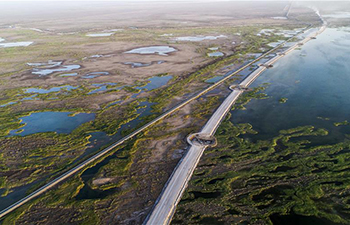by Xinhua writer Jin Jing
BEIJING, July 12 (Xinhua) -- The term "special relationship" was coined by former British Prime Minister Winston Churchill to describe the depth of connection between the United States and Britain following World War II.
Seven decades on, Britain is eager to reaffirm that "special" friendship as it wrestles with Brexit negotiations.
However, it seems that U.S. President Donald Trump's upcoming visit to Britain may create more rifts than it can bridge for the two transatlantic allies.
The four-day "working visit," which starts later Thursday, will fall short of the pomp and pageantry that bear the hallmarks of a state visit. According to his itinerary, the U.S. president will mostly stay away from London to avoid embarrassing protests.
Among his plans, the president will hold talks with British Prime Minister Theresa May at her Chequers country retreat in Buckinghamshire and meet Queen Elizabeth II in Windsor Castle before heading to Scotland for the weekend. All are places where protesters are believed to be kept out of sight and earshot.
The carefully drafted itinerary, however, will not stop many outspoken protesters from expressing their disapproval of the U.S. leader. Earlier, more than a million people signed a petition calling for Trump's visit to be canceled.
In the past, bound by history and traditions, the level of collaboration between the United States and Britain in trade, politics, military and intelligence sharing has been described as "unparalleled" among major powers.
But the name of America's "closest and most trusted friend" sometimes comes at a heavy cost. The painful repercussions of Britain's decision to invade Iraq in 2003 following the United States are still felt today.
The partnership was thrown under further doubt as Trump moved into the White House.
On Nov. 29, 2017, Trump retweeted a series of anti-Muslim videos posted by Jayda Fransen, the deputy leader of Britain First, a far-right ultranationalist group, a move repudiated by nearly every sector of British politics and society.
Even Theresa May had to respond by saying: "I'm very clear that retweeting from Britain First was the wrong thing to do." Jeremy Corbyn, the leader of the opposition Labor Party, called the retweets "abhorrent, dangerous and a threat to our society."
The rifts threaten to widen as the U.S. president rolled out a series of trade protectionist measures disregarding the world's fundamental trading rules and interests of its closest allies.
Further transatlantic divergence was feared after the United States pulled out of the hard-won Iran nuclear deal while threatening to undermine NATO.
Trump's latest outspoken support for former British Foreign Secretary Boris Johnson, a hard Brexit advocate who recently resigned over May's Brexit plan, and the U.S. president's suggestion that Britain is "in turmoil," are not helping either.
Considering the simmering unfriendly sentiment among the British public, how to mend and maintain such a "special relationship" may prove to be a challenge for Trump.













